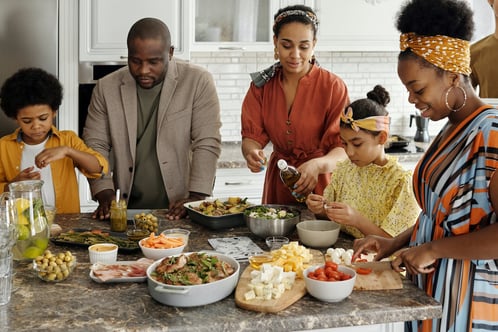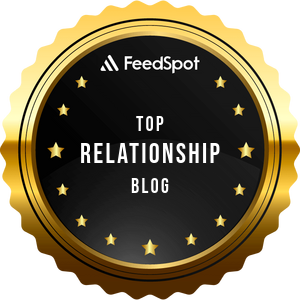
The Holidays are here again, and this time of year often brings on a large variety of emotions. While it might be exciting to see family you don't see often, it may also cause stress and anxiety. However, you're probably still wishing for a holiday season filled with love, joy, and peace, creating memories filled with old and new traditions. Why is that so elusive for so many?
The Holiday Season is generally busy, full of once-a-year events, activities, travel, and get-togethers with friends, neighbors, colleagues, and family. While being busy with a full calendar of needs, wants, and obligations may bring out the best in some, it can bring out the worst in others. For example, that person at the party that quickly divides the room by bringing up a highly debated and heated topic, such as current political issues! You may even call that person who turns the conversation from positive to negative the F word? You know, the one, FAMILY.
If this is your story, then you're not alone. Family relationships are becoming casualties of a toxic political environment where family members experience uncomfortable and nasty political arguments or avoid one another at the same gathering. Some family members are even cutting off lifetime relationships.
As a therapist, I often start with a client's family history to identify patterns, understand the family dynamics, and help them learn how to best manage. Behavioral patterns can become programmed in babies, and traits can be unconsciously carried on for decades, if not lifetimes. You might see this repeat within family generations in areas of addiction, affairs, or strife between siblings. Less desirable than the silver tea set handed down from generation to generation. So, understanding how family dynamics develop and repeat in the family tree is essential.
While children have little to no perspective about what's occurring in their family, it still impacts them significantly. Kids aren't able to understand the magnitude of what's happening within their family due to a lack of perspective and a developing brain, and they aren't equipped to understand healthy vs. unhealthy family dynamics. Kids are doing their best with what they're given, and those family dynamics become imprinted in their brains. That family pattern is often unconsciously repeated as adults in their lives and with their own families.
So, fast forward 20 years, and you've gathered for the Holiday celebration in a cozy house, and it's irrelevant what your life is like outside. History comes back, and fast! Suddenly, all your accomplishments, professional growth, and life experiences are no longer a reality. Because you quickly dive back into those old familiar patterns and find yourself again in those shoes of a five or 10-year-old. All the while, you don't realize it's even happening. Whether it's sibling rivalry of who mom loved the most, political divide with red vs. blue party lines, or even good old family dysfunction, you arrive at the Holiday dinner table with armor in anticipation of the family drama.
So, if you desire peace with family traditions and healthy family bonds, preparation before seeing your family is necessary for how you show up and your role in family interactions. These six steps will help you avoid reaching for the old shields from the ages of five or ten.
6 Tips For a Stress-Free and Joyful Holiday Season With Your Family
Tip #1: Plan and Focus on Healthy Change.

Before you leave home, remind yourself that lasting change takes time and practice. Send yourself a text reminder too. So, when that Brother-in-Law or Uncle begins to stir the pot and debate, and you find yourself getting anxious, these two fact checks will help:
- "It's not possible for me to control others."
- "Regardless of history, nobody can truly control me without my consent."
If you do feel that old negative family pattern creeping into your day, try the following for less stress and stay more mindful:
- Excuse yourself and help in the kitchen. Get creative with preparing and cooking the beautiful meal your family is lucky to enjoy.
- Take an interest in the children, and offer to play a game or read them a book.
- Seek and focus on talking with a family member you find interesting or enjoyable.
- Go outside and smell the season, enjoy nature and take a short walk.
- Walk into a private room to connect with your friend via FaceTime.
- Ask your host if you can bring board games or holiday trivia. Your host may enjoy the distraction of others asking when the meal is ready, and you may start a new tradition.
- Walk into the bathroom and listen to a 5-minute podcast. Or, use an App to listen to soothing sounds, like the ocean or raindrops.
Tip #2: Avoid Negative Talk and Time With Negative People.

If a family member goes down a negative path with hurtful gossip or heated topics like politics, you may feel triggered and want to react quickly. It's helpful to remember your choices at that moment. You can engage in a healthy way with a neutral response or become triggered and defensive with an immediate snarky reaction.
Responding vs. reacting to negative talk will always feel better and lead to more peace and healthier for you in the long run. Again, it takes practice to stay mindful and override the negative talk around you because negative talk can also be an addiction. However, making that effort to remain positive and the outcome for your growth is well worth the effort. A response will ensure you operate in your value system rather than getting hijacked into reactivity. You can do this with both verbal language or even body language. The resulting growth will be so satisfying in the long run.
Tip #3: Learn How Your Brain Works to Manage Your Triggers.

Your brain stem does a great job of keeping you alive. However, it's only sometimes reliable to distinguish between real and perceived danger. Your snarky sibling is (hopefully) not actually dangerous. Therefore, you don't need that cortisol-induced fight or flight reaction required when going to war. So, stay mindful of how your body attempts to protect you in a perceived danger vs. a real one.
If you're feeling triggered, before you react, stop and choose to take a break with the following:
- STOP: take in a full, deep breath. Then exhale. You are activating your parasympathetic nervous system, which will keep you calm.
- Make a cup of tea or drink a full glass of water.
- Go outside and search out five unique items you've never noticed.
- Slow your mind down and continue to slow your breathing.
- Take an inward moment to picture yourself 50K feet above the environment to view the dysfunctional pattern. You might even think of how you'd advise a friend to respond. Taking that moment can provide clarity.
Tip #4: Is Conflict Bad? The Reality of Conflict.

- Conflict is neither good nor bad; it just means you see things differently.
- Conflict is a chance to become curious and discover how others view the world. (Like a journalist.)
- Conflict is an opportunity to learn about another person's perspective.
- Managing conflict in a healthy way starts with practicing curiosity.
- Conflict will only grow when you view it through the lens of judgment.
Tip #5: What To Do When Conflict Happens - Let's Break it Down.

- If a conflict occurs near you, it's vital to remind yourself that you aren't in charge of what's happening all around you.(You aren't the party police officer.)
- You aren't responsible for creating or repairing your family dynamic.
- You can only decide if you want to respond or react.
- If something happens that strikes a negative chord, take a deep breath and tell yourself:
- "Because I feel momentarily triggered doesn't mean I need to react immediately."
- "I always have a choice. I can choose to respond calmly rather than react."
Tip #6: Step Up Your Daily Self-Care Routine.

Give yourself extra tender loving care during the Holidays. If your love tank is full, it will help you stay mindful through the genuine "growth opportunity" moments. Choose to grow with these ideas for Holiday self-care:
- Rain or shine, go outside in nature and feel, see, hear and smell what surrounds you.
- Balance negative feelings by listening to inspiring audiobooks.
- Crank up and enjoy listening to joyful holiday music.
- Explore new things, like a new and unique body massage. Or, a facial.
- Fill your home with holiday smells of hot cocoa, gingerbread, cinnamon, pine, etc.
- Try a new skill to strengthen your creativity by painting a Holiday dream picture. What vision comes to you? Be brave and put your ideal picture onto canvas to hang and enjoy.
- Cook a healthy and nurturing "hygge" meal to share with a loved one you hold dear.
- Nestle with a piping cup of hot tea or cocoa in front of a fire with that great book.
- Run a warm bubble bath, light candles, and soak for as long as you desire.
Remember, shifting your listening to a curious ear vs. a judgmental ear to understand fully is essential in family dynamics. By avoiding landmine moments at Holiday gatherings, like engaging in sibling rivalry or political arguments, you'll likely prevent unnecessary hurt and toxicity from damaging a lifetime of loving family relationships. These relationships impact your family bonds for generations to come.
I hope you have a wonderful Holiday Season, and these six tips help lessen your stress and make you feel more peaceful during your holidays to focus on human compassion, kindness, and joy!
If you're struggling with family stress in challenging family dynamics or communication, we're here to help with our Imago Relationships Workshops and Imago Imago Relationships Therapy.
Discover more about Imago with our Imago Professional Membership, Imago Professional Facilitators, and Imago Professional Training.
%20/images/Jeannie%20Ingram%2c%20LPC-MHSP%20-%20Imago%20Relationships%20North%20America.jpg?width=160&name=Jeannie%20Ingram%2c%20LPC-MHSP%20-%20Imago%20Relationships%20North%20America.jpg)
This blog post was written by Jeannie Ingram, LPC - MHSP, Certified Advanced Imago Relationship Therapist.
Jeannie Ingram is a Licensed Professional Counselor, Certified Imago Relationship Therapist, speaker, and workshop presenter in private practice in Nashville, TN.
She has a Bachelors Degree in Psychology, a Masters in Counseling from the University of Alabama at Birmingham, and a Post-Baccalaureate Certificate in Marriage and Family Therapy from Capella University. Using this training, along with decades of experience in crisis intervention, she helps couples and individuals heal and live more intentionally. In addition, she is a Clinical Instructor for the International Imago Training Institute and Interim Director of Tapestries Counseling Center in Nashville, TN. She is certified to present Getting the Love You Want, Keeping the Love You Find, and Start Right, Stay Connected Imago couples workshops across the Southeast. She loves cooking, writing, hiking, camping, kayaking, and sailing.
Most of all, she is dedicated to helping couples and individuals find joy, meaning, success, and connection through the practice of mindfulness and purpose in their lives.



